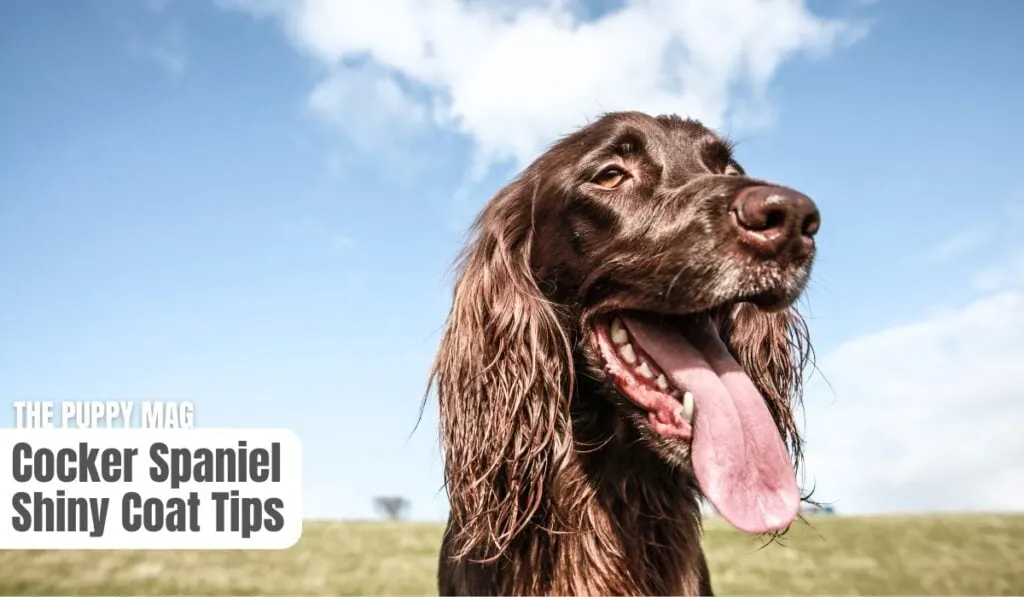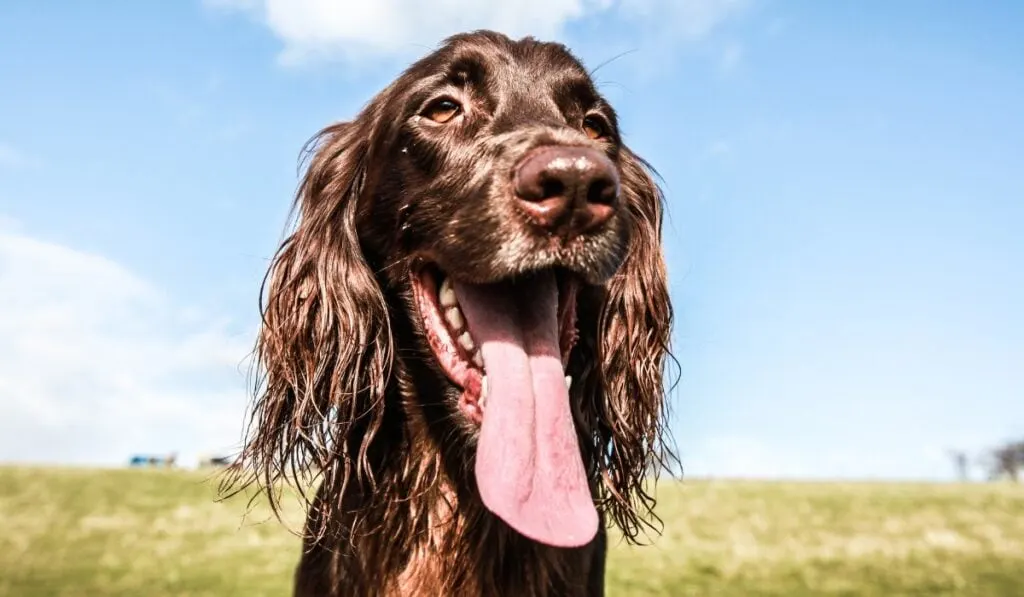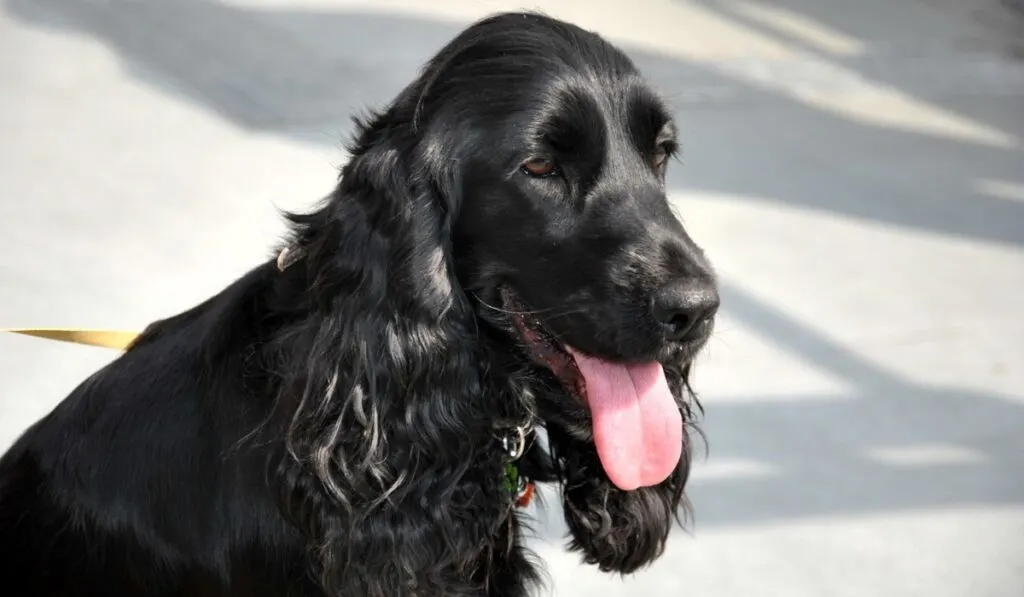Cocker Spaniels are known for their beautiful, flowing coats. But if you’ve noticed your furry friend’s coat looking a bit dull, don’t worry!
With the right care and attention, you can restore that healthy, shiny appearance in no time. But before we discuss how to do that, let’s understand why your Cocker Spaniel’s coat might not be as shiny as it could be.

Are Cocker Spaniels Supposed to Have Shiny Coats?
The short answer is yes, Cocker Spaniels are known for their luxuriously silky and shiny coats!
The coat of a Cocker Spaniel is naturally shiny and comes in various color patterns, each one equally stunning. The upper coat is silky and either flat or slightly wavy, while the undercoat is dense and short. The shine of their coat is not just for show, but it’s also an indicator of their health.
A well-groomed and healthy Cocker Spaniel will have a coat that is shiny and full of life. Conversely, a dull, lifeless coat might indicate an underlying health issue, poor nutrition, or inadequate grooming.

10 Ways To Keep Your Spaniel’s Coat Shiny
Let’s get into the ways you can ensure your spaniel keeps their coat nice and shiny.
1. Feed Your Cocker Spaniel a Balanced Diet
Nutrition plays a pivotal role in maintaining a shiny coat. Feed your Cocker Spaniel a well-balanced diet that includes essential fatty acids. Foods rich in omega-3 and omega-6 fatty acids, such as fish and flaxseeds, can contribute to a healthier coat. Best Food For Cocker Spaniels
(Source: Veterinary Centers of America)
2. Regular Grooming is Essential
Regular grooming not only keeps your pet looking great, but it also stimulates natural oil production in their skin, which enhances coat shine. Consider using a grooming brush specially designed for Cocker Spaniels to prevent hair breakage and distribute the oils evenly across the coat.
3. Bathe Your Cocker Spaniel Regularly, but Not Too Often
While it’s important to keep your Cocker Spaniel clean, over-bathing can strip the natural oils from their skin, leading to a dry and dull coat. Use a natural dog-safe shampoo that moisturizes their skin and enhances their coat’s shine. (Source: Cornell University College of Veterinary Medicine)
4. Hydrate, Hydrate, Hydrate
Ensure your Cocker Spaniel always has access to fresh water. Hydration plays a crucial role in skin and coat health. You can place more water bowls around the house to keep your spaniel in close proximity to their water. It’s also worth adding some weak meat broth from time to time to keep your spaniel drinking.
5. Regular Check-Ups with the Vet
Regular vet check-ups can help identify any potential health issues that could be affecting your pet’s coat. Parasites, allergies, or skin conditions can all impact the appearance of your Cocker Spaniel’s coat. Regular vet visits will ensure that any such issues are identified and treated promptly.
By following these tips, your Cocker Spaniel’s coat can truly shine, reflecting not just their physical beauty, but their overall health and wellbeing.
6. Use Grooming Wipes for Quick Clean-Ups
Sometimes, your Cocker Spaniel may need a quick clean-up in between baths. This is where grooming wipes come in handy. They’re perfect for cleaning your pet’s coat and can also help to add shine. These wipes are especially useful after walks or if your furry friend has a knack for finding dirt!
7. Invest in a High-Quality Brush
Investing in a high-quality brush is a great way to keep your Cocker Spaniel’s coat shiny. Ideally, you should have a slicker brush and a comb. The slicker brush removes loose hair and detangles, while the comb goes through the topcoat, adding shine. Regular brushing also stimulates the skin to produce natural oils which contribute to a glossy coat.
8. Conditioning Sprays are Your Friend
Using a conditioning spray after your Cocker Spaniel’s bath can help lock in moisture and add an extra layer of shine to their coat. Look for sprays that contain natural oils for the best results. Be sure to test the product on a small area first to make sure your pet doesn’t have a reaction.
9. Regular Trimming to Avoid Matting
Cocker Spaniels are known for their long, silky fur, but without regular trimming, the hair can become matted and dull. A professional groomer can help trim your Cocker Spaniel’s hair to a manageable length, preventing matting and promoting shine.
10. Keep Their Bedding Clean
Cocker Spaniels’ coats can pick up dirt and oils from their bedding. Regularly washing their bedding helps prevent this buildup, helping maintain a cleaner, shinier coat.
By incorporating these grooming tricks into your routine, your Cocker Spaniel’s coat will not only look great but also reflect their overall health. Remember, consistency is key, and a healthy coat is a reflection of good health from within.

7 Reasons Your Cocker Spaniel’s Coat May Be Dull
Let’s clarify the reasons why your cocker spaniels coat might have gone dull, if that’s the case.
It’s always best to follow the tips above to ensure a dull coat doesn’t take over, but sometimes life gets in the way and all of a sudden it happens. Here’s the likely reasons why
Too Many Baths
While it might seem counterintuitive, bathing your Cocker Spaniel too frequently can actually make their coat dull. This is because over-washing can strip the coat of its natural oils that help maintain shine and health. It’s important to find a balance: keep your dog clean, but allow those beneficial oils to do their job.
Using the Wrong Shampoo
Not all shampoos are created equal, especially when it comes to your pet. Some dog shampoos might be too harsh for your Cocker Spaniel’s sensitive skin and delicate coat, stripping away natural oils and leaving the coat looking dull. It’s best to opt for a natural ingredient dog shampoo so you preserve the oils on your spaniel’s coat.
Diet Lacking in Nutrients
Your Cocker Spaniel’s diet directly affects the health and shine of their coat. If they’re not getting the necessary nutrients – particularly essential fatty acids like omega-3 and omega-6 – their coat may lose its luster. A balanced, high-quality diet is essential for your pet’s overall health and the condition of their coat.
Dehydration
Just as hydration affects our skin and hair, it plays a crucial role in the health of your Cocker Spaniel’s coat. If your dog is not getting enough water, their coat can become dry and dull. Make sure your furry friend always has access to fresh, clean water.
Dirty Bedding
If your Cocker Spaniel’s bedding is dirty, it can transfer grime and oils onto their coat, causing it to look dull. Regularly cleaning your pet’s bedding can make a significant difference to the cleanliness and shine of their coat. Not to mention, it’s also a great way to keep potential skin irritants at bay.
Inconsistent Brushing Routine
Cocker Spaniels have a gorgeous, but high-maintenance coat. Without regular brushing, their coat can quickly become matted and lose its shine. Regular brushing not only helps prevent this but also stimulates the skin to produce more natural oils, improving the shine of the coat.
Underlying Health Issues
If your Cocker Spaniel’s coat is dull, it could be a sign of an underlying health issue, such as skin infections, hormonal imbalances, or external parasites. Regular vet check-ups are crucial in catching and addressing these issues early, maintaining not just the coat’s health, but your pet’s overall wellbeing.
Last thoughts
Maintaining the luxurious shine of your Cocker Spaniel’s coat requires consistent care, proper nutrition, and regular check-ups with the vet. But the effort is worth it. Not only will your pet look fantastic, but their shiny coat will also reflect their overall good health.
